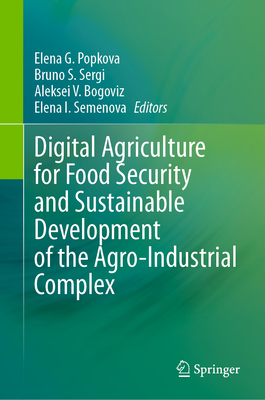The book discusses the best international practices in digital agriculture. The book aims to form systemic scientific and methodological support and develop comprehensive applied solutions to unlock the potential of sustainable development of digital agriculture for food security. The book’s contribution to the literature lies in its comprehensive treatment of public and corporate management of farms representing digital agriculture. The research novelty is associated with the systemic disclosure of economic, legal, and technological issues in the development of digital agriculture. Thus, the book provides a solid foundation for integrating food security interests into farming practices. The first part of the book reflects the economic, legal, and technological support of quality management and sustainable development in digital agribusiness based on the best international practices. The second part focuses on Russian and international agricultural policies forfood security. The book is intended for members of the academic community who will find promising solutions to current problems of food security through the development of digital agriculture. The book will also be of interest to farmers and representatives of the state regulation of the agricultural economy. In this book, they will find practical recommendations for improving government and corporate management of food security through the development of digital agriculture.
The book discusses the best international practices in digital agriculture. The book aims to form systemic scientific and methodological support and develop comprehensive applied solutions to unlock the potential of sustainable development of digital agriculture for food security.
The book''s contribution to the literature lies in its comprehensive treatment of public and corporate management of farms representing digital agriculture. The research novelty is associated with the systemic disclosure of economic, legal, and technological issues in the development of digital agriculture. Thus, the book provides a solid foundation for integrating food security interests into farming practices.
The first part of the book reflects the economic, legal, and technological support of quality management and sustainable development in digital agribusiness based on the best international practices. The second part focuses on Russian and international agricultural policies for food security.
The book is intended for members of the academic community who will find promising solutions to current problems of food security through the development of digital agriculture. The book will also be of interest to farmers and representatives of the state regulation of the agricultural economy. In this book, they will find practical recommendations for improving government and corporate management of food security through the development of digital agriculture.
Get Digital Agriculture for Food Security and Sustainable Development of the Agro-Industrial Complex by at the best price and quality guranteed only at Werezi Africa largest book ecommerce store. The book was published by Springer International Publishing AG and it has pages. Enjoy Shopping Best Offers & Deals on books Online from Werezi - Receive at your doorstep - Fast Delivery - Secure mode of Payment
 Jacket, Women
Jacket, Women
 Woolend Jacket
Woolend Jacket
 Western denim
Western denim
 Mini Dresss
Mini Dresss
 Jacket, Women
Jacket, Women
 Woolend Jacket
Woolend Jacket
 Western denim
Western denim
 Mini Dresss
Mini Dresss
 Jacket, Women
Jacket, Women
 Woolend Jacket
Woolend Jacket
 Western denim
Western denim
 Mini Dresss
Mini Dresss
 Jacket, Women
Jacket, Women
 Woolend Jacket
Woolend Jacket
 Western denim
Western denim
 Mini Dresss
Mini Dresss
 Jacket, Women
Jacket, Women
 Woolend Jacket
Woolend Jacket
 Western denim
Western denim
 Mini Dresss
Mini Dresss






























































